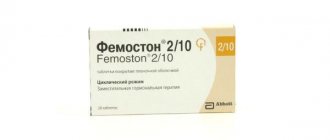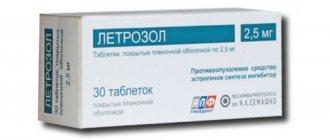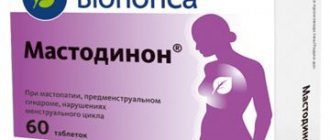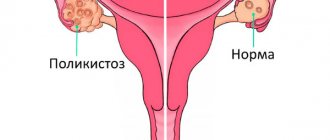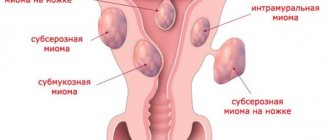What is fibroid: symptoms and causes of the disease
Uterine fibroids are a benign formation that can occur in all women of reproductive age. The risk of developing the disease increases after 35 years of age. Most often they learn about this disease during a gynecological examination. If the node is small, there are practically no symptoms, so the woman may not even suspect that her health is not all right. If it grows and increases, then the cycle is disrupted, nagging pain appears in the lower abdomen, and menstruation is too heavy or scanty.
Although experts are still not entirely sure what the true cause of the node is, there are two main versions:
- heredity – genetic predisposition to fibroids;
- hormonal imbalance - estrogen and progesterone have a positive effect on the growth of education. Therefore, when carrying a child, hormonal levels increase and the node grows. And during menopause it dries out.
When the tumor grows and makes itself felt, treatment is indicated. There are different ways to combat this disease - from medications to surgery. One of them is eliminating the very cause of the disease, that is, the effect on hormonal levels. To do this, as prescribed by a doctor, they take special medications that can regulate the amount of hormones. These include Ginestril.
Description of Ginestril
Ginestril is an artificial hormonal drug made on the basis of the steroidal antihistogenic substance - mifepristone. Its action is aimed at blocking the production of progesterone at the receptor level, a hormone due to which the myomatous node grows.
As a result of taking the drug, the cells of the node stop their development. For most women, the tumor shrinks. The medicine has no effect on the muscle tissue of the uterus. It also does not affect the amount of estradiol in the blood, the activity of the mammary glands, the cardiovascular system, or the endocrine glands. Tablets of the drug are available in blisters of 10 pieces. They have a light green or yellow tint. Each pill contains 50 mg of active substance. The maximum concentration occurs after 1.3 hours. The body absorbs about 70% of the drug.
The price of the package ranges from 5.3 thousand rubles to 6.5 thousand rubles. The medicine can be purchased at a pharmacy only with a doctor's prescription.
Taking hormonal medicine yourself without a gynecologist’s prescription is strictly prohibited. This can lead to bad consequences.
The effect of "Ginestril" on the female body
"Ginestril" has found wide use for the treatment of uterine fibroids, since it is an effective remedy that can stop the functioning of progesterone receptors, which stimulate the development of fibroids. Thus, the drug eliminates the reaction of progestrogen binding to receptors, promoting not only a reduction in size, but sometimes even the resorption of myomatous nodes. With all this, the drug does not affect the amount of such an important female hormone as estradiol, and therefore does not affect the functioning of the mammary glands and endocrine glands. The use of the drug is advisable when the nodes are located in the myometrium and under the serous uterine membrane with their diameter not exceeding three centimeters and the size of the uterus not exceeding twelve weeks of pregnancy.
Indications and contraindications
This medicine is used both to combat nodes and as an emergency contraceptive to terminate an unwanted pregnancy. The main indications for use of the drug are as follows:
- treatment of a tumor up to 12 weeks in size. For large formations, the medicine will not give the desired effect;
- long and heavy periods;
- Ginestril after removal of fibroids can also be effective as additional hormone therapy;
- termination of an ectopic pregnancy at a short term;
- abortion for up to 3 months, induction of labor;
- Contraceptive after unprotected sex.
The drug should not be used in the following cases:
- for porphyria and anemia;
- blood clotting disorders;
- acute pathologies;
- the presence of a tumor or cyst in the ovaries;
- inflammation of internal female organs;
- during pregnancy and lactation;
- hypersensitivity to the components of the drug;
- disruption of homeostasis;
- renal failure;
- nodes are too large.
Ginestril: instructions for use of antigestagen tablets
For uterine leiomyoma
Ginestril is usually prescribed in a single daily dose of 50 mg. The drug is taken orally for 3 months.
The use of Ginestril in dosages of up to 2 grams did not cause negative reactions.
In case of overdose, adrenal insufficiency may develop, which requires symptomatic treatment.
Ginestril is a steroid drug that has an antigestagenic effect.
Compound
One tablet of the antigestagenic drug contains 50 mg of the main active ingredient, which is mifepristone. Additional components of the pills are presented:
- Calcium stearate
- Microcrystalline cellulose
- talc
- Sodium carboxymethyl starch.
Medicinal properties
The Ginesteel component is classified as an artificially produced antigestagenic steroid substance.
Mifepristone has an antihistogenic effect at the receptor level, blocking the action of the hormone progesterone, while its gestagenic activity does not manifest itself.
The drug Ginestril is prescribed for daily use for three months. In the postoperative period, take one tablet, but every other day; the course of treatment in this case lasts at least three to four months. All this time, the condition of the uterus is monitored using ultrasound, and if indicated, treatment can be extended.
An overdose from taking tablets is rare and can be expressed by nausea, vomiting, weakness, loss of strength, and manifestations of adrenal insufficiency. In such a case, Ginestril is discontinued and symptomatic treatment is carried out. However, in the vast majority of cases, the drug is well tolerated and does not cause negative symptoms.
Ginestril is not prescribed with the simultaneous use of non-steroidal anti-inflammatory drugs in the form of Aspirin, Ketanov, Diclofenac, Voltaren. When using glucocorticoid drugs, the dose of Ginestril may be adjusted, since the effectiveness of this medication may be reduced.
Mode of application
To treat uterine fibroids, Ginestril is taken for at least three months, but, judging by reviews, many patients are treated with it for at least six months.
You need to take the tablets every day. After 90 days, an examination takes place.
Using an ultrasound, the doctor looks to see whether the node has shrunk and by how much. Depending on the results, the doctor may extend conservative treatment. If the drug is prescribed after surgery as a concomitant therapy, it should be taken every other day for 3-4 months.
The medicine is strictly prohibited to be used together with non-steroidal anti-inflammatory drugs. Among them: Aspirin, Ketanov, Diclofenac, Voltaren and others.
When using glucocorticoids (for renal failure), it should be understood that the effectiveness of the drug will be reduced. Therefore, the doctor may adjust the dosage.
Ginestril: what is the drug
Uterine fibroids are a hormone-dependent disease that occurs when the balance of sex hormones in a woman’s body is disturbed. Therefore, drug treatment suggests the possibility of correcting this condition. Read more about the important nuances of hormonal treatment for fibroids in our previous article.
Expected effects of drug therapy for fibroids:
- Slowing down the growth of tumor nodes,
- Reducing the severity of clinical symptoms of the disease,
- Preservation of the uterus for women planning pregnancy
- Improving the quality of life of patients.
Taking hormonal medications allows you to control the growth of myomatous nodes and reduce their clinical manifestations.
A well-known representative of the group of drugs that meets all the listed requirements and has been studied for its effectiveness against uterine fibroids is Ginestril.
According to the pharmacological classification, Ginestril is classified as an antigestagen drug. Antigestogens (or antiprogestins) are substances that have a high affinity for progesterone receptors and suppress the action of this hormone at the receptor level.
For reference
Back in 1980, the world's first antiprogestin was synthesized, which was named Mifepristone. Initially, this drug was used for medical termination of pregnancy in the early stages. Subsequently, its effectiveness was also proven in relation to the treatment of uterine fibroids. Mifepristone has been used to treat the disease abroad since 1993.
Mifepristone was obtained by chemists at the Roussel-Uclaf pharmaceutical laboratory, headed by physician and scientist Emile Etinne Boliou, in April 1980.
Mechanism of action
Today it is generally accepted that the main role in the occurrence and stimulation of the growth of myomatous nodes belongs to progesterone. Other sex hormones (estrogens) play a supporting role and support the effects of progesterone.
Mifepristone is an active substance that has a competing effect with the sex hormone progesterone. The drug binds to progesterone receptors several times (from 2 to 10) faster than its own hormone.
Taking the place of progesterone, mifepristone has the opposite effect - it inhibits the growth of fibroid nodes and promotes their reverse development.
In the Russian Federation, Mifepristone is registered under the trade name Ginestril and has been used in medical practice since 2005. In 2008, the drug was recommended for the treatment of uterine fibroids and included in the Federal Guide of the Russian Federation for Gynecology.
The development of fibroids is caused by a hormonal imbalance between progesterone and estrogen.
Effects of Ginestril:
- Reduces the size of nodes in the uterus and reduces its size,
- Increases hemoglobin levels by reducing menstrual blood loss,
- Eliminates discomfort and pain.
After taking Ginestril orally, the tablet is very quickly absorbed from the gastrointestinal tract, and after 1.5 hours a high concentration of the active substance is noted in the blood plasma. The drug is excreted from the body through urine and feces.
What happens during drug therapy with Ginestril:
- Artificial menopause occurs. Stopping menstrual flow in women suffering from uterine bleeding is a beneficial effect,
- Cell death (apoptosis) occurs in the nodes, proliferation (growth) processes stop, a decrease in tumor size is noted,
- Stopping bleeding helps eliminate anemia,
- Reducing negative clinical manifestations significantly improves the quality of life of patients.
Restoration of menstrual function occurs 3-6 weeks after cessation of drug therapy.
Taking Ginestril helps reduce symptoms and regression of fibroids.
Side effects
In most cases, the body tolerates this drug well, but if the dosage is increased, kidney failure may occur. In addition, the use of the drug is sometimes accompanied by side effects. Among them:
- weakness and fatigue;
- failure of menstruation;
- acute abdominal pain;
- decreased sex drive;
- disturbance of the gastrointestinal tract system, which is accompanied by diarrhea, vomiting, nausea;
- increased body temperature;
- allergy.
pharmachologic effect
Despite the fact that the drug most often does not have any undesirable effects on the female body, however, in some certain situations it can cause side effects. These may be the following changes in the usual state, namely:
- The appearance of dizziness and headaches, fatigue, weakness.
- Irregularity of the menstrual cycle with the development of amenorrhea, loss of libido.
- Disorders of the gastrointestinal tract, with the development of a feeling of discomfort and heaviness in the abdomen.
- A sharp change in blood pressure with an increase and decrease in its indicators.
- Development of acute pain in the lower abdomen.
- Allergic skin rashes, as well as itching and redness of certain areas of the body.
Today we will learn about its mechanism of action, indications and adverse reactions.
We will analyze in detail the rules of use and the list of contraindications for the medicine, as well as how effective it is.
The drug Ginestril is available in the form of tablets containing 50 mg of mifepristone.
Tablets are sold in 30 pieces per pack.
Other substances are also used in production:
- Potato starch;
- Lactose;
- Microcrystalline cellulose;
- Povidone;
- Magnesium stearate;
- Sodium carboxymethyl starch.
Antigestagenic.
Digestive system:
- nausea turning into vomiting;
- diarrhea.
Reproductive system:
- bloody issues;
- amenorrhea;
- menstrual disorder;
- lochiometer;
- deepening of inflammatory processes of the appendages and the uterus itself;
- subinvolution of the uterus.
Other:
- pain and discomfort in the lower abdomen;
- hyperthermia;
- weakness.
Concomitant use of NSAIDs is not recommended.
When combined with glucorticoids, the dosage of the latter should be increased.
Analogs
Ginestril is not the only drug prescribed for the treatment of fibroids. There are analogs from other manufacturers that contain the same mifepristone. Names: Mifepristone, Zhenale, Agesta, Mifeprex. They all have different prices.
Esmiya drug: reviews, instructions for use
Often, as an alternative to Ginestril, doctors prescribe Esmiya. This drug is more expensive, but you can take it even with large fibroids.
Patient reviews
It should be understood that each body is individual. Therefore, the node reacts differently to the drug. Reviews for fibroids say that Ginestril helps some people forget about the disease for a long time, while others manage to defeat the disease completely. And in some women, the growth of tumor cells resumes after cessation of conservative treatment. Here's what they say:
Galina, 38 years old
“I was diagnosed with uterine fibroids at the age of 36. Since then, for about seven years, I have been regularly seen by a doctor. The tumor was small - 6 weeks. But as time passed, it began to grow. Removal was initially out of the question, since I am very afraid of operations. And the doctor suggested an alternative - to drink Ginestril. The drug is quite expensive, but for me it was better than a knife. I took it for three months. I remember this time with horror. There was constant weakness, headaches, and kidney pain. The knot actually got smaller within 4 weeks. But six months later it began to grow rapidly again. In the end, I had surgery. I had the tumor removed along with all my female organs, on the recommendations of three doctors. Now I am suffering from pain in my legs, I often get feverish - all the delights of early menopause are evident. Unfortunately, for me the drug turned out to be only a temporary solution to the problem.”
Nadezhda, 43 years old
“Strange abdominal pain and heavy periods tormented me for a long time, but I still couldn’t get to the doctor. Work, home, family. When I finally got an appointment, the gynecologist sent for an ultrasound and discovered a fibroid. By that time I already had a rather large knot measuring 12 weeks.
I could still be observed and not have surgery, but if the tumor grew, I could not avoid surgical intervention. The gynecologist suggested conservative treatment with Ginestril. I decided to try it. In three months the node shrunk by half, after six months - up to 4 weeks. Until I stopped drinking it. I see a doctor regularly, the fibroids are not growing. I hope she “quiets down” there for a long time and she won’t have to have surgery after all. For those who are afraid of a knife, I recommend giving it a try.”
Maria, 28 years old
“I'm only 28 years old. And my fibroid is small - 33 mm, I plan to have another child. Doctors advised me to take hormones.
I didn’t have any side effects as such, just stomach problems. But I had them before. After three months, the node decreased by 5 mm. I continue to take the drug. I hope for a good result. The doctor said that so far the dynamics are positive.”
Antonina, 37 years old
“Perhaps this drug is suitable for someone, but obviously not for me. I had fibroids for 8 weeks. The doctor prescribed Ginestril. I suffered for about a month. I have never had such headaches. The temperature was also constantly rising. Then I decided that enough was enough and stopped drinking it. Now I haven’t done anything for six months, I’m seeing a doctor. I'm afraid of surgery like hell. Thank God the knot is not growing.”
Doctors' opinion
Doctors' views on the effectiveness of this drug are divided. Many experts believe that if fibroids are detected at an early stage, they can be defeated with medication using hormonal drugs such as Ginestril.
Doctors note that if a woman experiences menopause after using the drug, there is a possibility of avoiding surgery, because during menopause the node dries out.
Some are convinced that the medicine only temporarily stops the growth of the node, and often recommend it to women who are afraid of surgery. However, they warn that even after its use, surgery may be required. Some doctors claim that after stopping the drug, the tumor resumes active growth. Therefore, drug treatment is not considered at all as an alternative to surgery. When turning to hormonal drugs, you should remember that reducing a tumor does not guarantee that it will not develop into a malignant one.
Why is Ginestril used in the treatment of fibroids?
After progesterone receptor blockers were created, new possibilities for the treatment of myomatous nodes appeared:
- A synthetic drug with antiprogesterone activity acts on a key factor in the development of tumor formation of the uterus, reduces fibroids by more than 50% and prevents the growth of new ones,
- The drug is prescribed for women with severe anemia for the purpose of preoperative preparation to reduce blood loss and stabilize the growth of nodes. After a course of drug therapy, fibroids are removed (UAE, FUS ablation, laparoscopic myomectomy),
- Ginestril makes it possible to use organ-saving surgeries for those patients for whom preservation of reproductive function is important. Using the drug during menopause allows you to avoid surgery altogether,
- The use of Ginestril in the postoperative period prevents the appearance of new fibroid nodes,
- With the help of Ginestril, you can delay surgical treatment, reduce the symptoms of the disease,
- Convenient dosage regimen,
- Good individual tolerance.
Ginestril allows you to reduce the size of nodes and avoid serious surgery.
